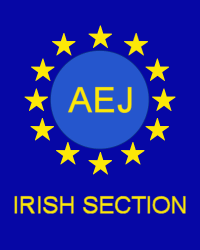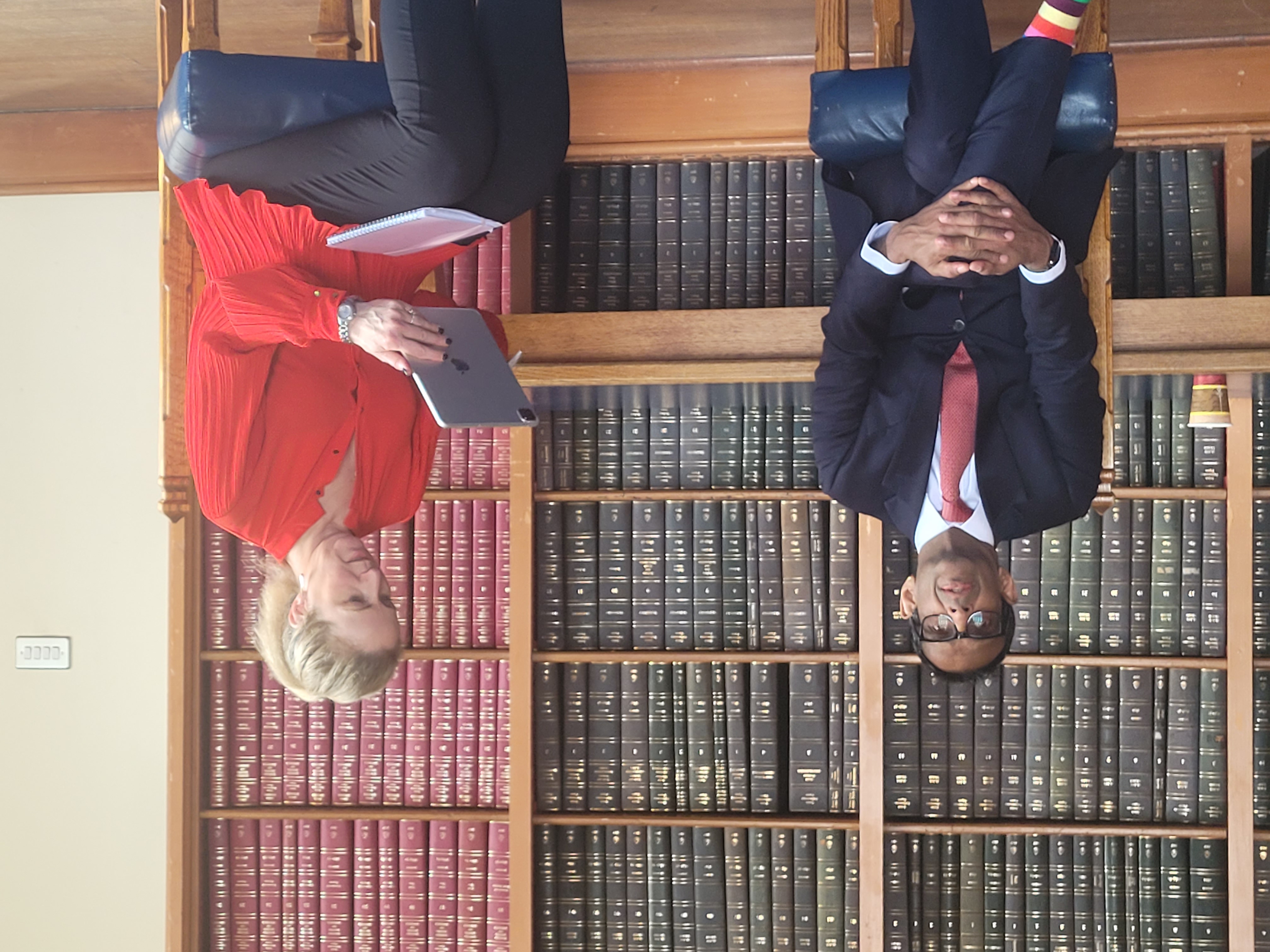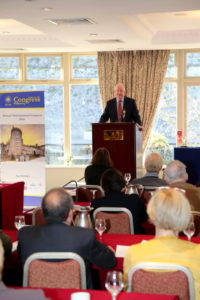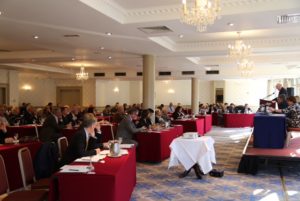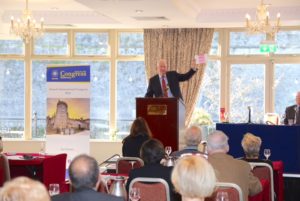Just two days ago, our Taoiseach – Prime Minister – and myself hosted the first of a series of Brexit civic dialogue events in Dublin, bringing together well over 200 people from all across this island, north and south. The objective of this dialogue process is to listen to a wide variety of voices, so as to inform the government here as it manages the Brexit process at home and prepares for negotiations on the terms of the UK’s exit.
That event was well-oversubscribed, reflecting the extent of public awareness and interest in Brexit here. A second indicator was the level of media interest from home and abroad.
Throughout the day, we focused on Ireland’s key priorities in the Brexit process:
- Our economy and trading relationships with the EU, with the UK and globally
- Northern Ireland and preserving the invisible border on this island
- The Common Travel Area between Ireland and Great Britain
- And of course, Ireland at the heart of a continued strong European Union focused on peace and prosperity
I mention peace because I have always believed that at its heart, the EU is a peace process –forged from the embers of a devastated continent reeling from the catastrophe of two horrific wars. Throughout it’s almost sixty years in existence our Union has provided a robust framework which among other things has provided an enabling environment, allowing neighbours engage peacefully with one another.
This is certainly the case in Northern Ireland, where the EU has – quietly, but very effectively and with real, practical support – underpinned the peace process of recent decades. As you can imagine, part of my job is to work to ensure that the Brexit process and the eventual outcome protects rather than damages the progress made in Northern Ireland.
In line with today’s theme, I will focus my remarks on Ireland’s approach to the Brexit negotiations process where we of course will be part of the EU team.
In many respects, it is difficult to believe that the UK’s referendum only took place a little over 4 months ago.
There has been much water under the bridge since the 24 June – not least a new Prime Minister and a changed ministerial line up in the United Kingdom.
And since that date, we in Ireland and across the EU have adjusted to the reality that while our Union will continue – of that I have no doubt – it will do so without the UK as a Member State.
I have had many conversations on this subject with my EU counterparts, both before the referendum and since. In most of these exchanges, I was struck by the fact that we here in Ireland were alive to the implications of a Brexit, far before many of our partners.
So while the disappointment was very real here on the morning of the 24 June – we did not share the sense of shock that perhaps prevailed elsewhere.
This should come as no surprise: the simple reality is that given the unique historical, political, social and economic ties between these two islands, “Brexit” entered the lexicon in Ireland some time ago.
For about a year leading up to the referendum the Government engaged in a contingency planning process. Expert reports were commissioned. All relevant Government Departments were asked to examine the possible impacts of a Brexit vote on their sectors – from foreign affairs to justice to energy, transport, agriculture, trade and so on.
In advancing this work we consulted with State agencies, with business representatives, trades unions and other stakeholders. For my own part, I briefed my colleagues in Government on a very regular basis.
While we strongly supported a Remain outcome, we realised it was necessary to have contingency measures in place, should a different outcome emerge. We have long experience of referendums in Ireland and that certainly informed the Government’s approach. The net result was that when the extremely disappointing result was announced on 24 June, Ireland was as ready as we could be for the next phase.
In the intervening weeks and months, some clarity has emerged on key issues. On Wednesday at our Civic Dialogue, the Taoiseach described the situation as “evolving”. Developments in recent days emphasised the validity of that assessment.
We know that the UK PM has expressed an ambition to trigger Article 50 no later than the end of March next year and we closely are following developments.
The bottom line is: Ireland needs to be ready for when Article 50 is triggered.
Since Theresa May indicated her planned timeframe preparations have been stepping up a gear for the inevitably complex negotiations process ahead.
So where does Ireland stand as this process gets underway?
First and foremost, our position on EU membership is unchanged: we remain wholeheartedly committed to our membership both of the European Union and of the Eurozone. This should go without saying but every now and then – mostly outside Europe but occasionally inside it – red herrings can surface.
Although geographically on the periphery of Europe, Ireland has always seen itself at the heart of the EU; a position consistently supported and shared by the Irish public. The EU is fundamental to our economic well-being and our sense of where we are in the wider world.
Secondly, we have a very clear sense of what our priorities will be in the negotiations. As mentioned earlier, they include:
- Northern Ireland and protecting the peace process; and
- retaining the open border with Northern Ireland and preserving the Common Travel Area between the UK and Ireland.
- the economy and trade – which unlike many of our partners is particularly interconnected in nature with some €1.2 billion in trade passing between these two islands each and every week;
These concerns are unique and specific to Ireland – but we also have an enormous stake in the future relationship between the Union and the UK. In terms of trade, we are more connected with the UK than is any other Member State. Our economy is more affected by British economic fluctuations than anyone else’s. As regards fisheries, prawns and mackerel – our main stocks – are not constrained by invisible marine boundaries, so the departure of the UK from the Common Fisheries Policy will pose very grave challenges. Or, to take another example, Irish researchers work in partnership more with UK colleagues than with those from any other Member State. There are very many other such examples across a wide range of sectors.
That is why we have a particularly strong interest in working for a British departure from the European Union which is as smooth as possible. And for a future relationship which is close and positive.
Let me be clear. Ireland has no doubt as to which team it will be on once negotiations start – the EU team. In the negotiations, we will be serving Irish interests – and those interests include a strong, cohesive, dynamic and outward-looking European Union.
But we believe it will be in the interests of Ireland, of the EU, and of the UK itself for the end of the old relationship, and the start of the new, to be achieved in a mature, friendly way. Nobody would gain from a complete breakdown.
At both political and official levels, it continues to be the Government’s objective to use every opportunity to sensitise our EU partners and the EU Institutions to our priorities as preparations e for what is shaping up to be a very busy 2017 start to intensify.
To that end, I am continuing with ongoing consultations with my Foreign Minister colleagues and of course, the Taoiseach has been leading from the front with regular discussions with other EU leaders. Our officials, and our Embassies across Europe, are also fully engaged.
It is discussions at EU head of government level that are driving the process of reflection on the renewal and future orientation of our Union. The “Bratislava Process”, as agreed by the 27 EU leaders when they met in the Slovak capital in mid-September, maps out many of the key priority areas which need to be addressed to protect and promote the EU in the period ahead. That agenda is pragmatic, concrete and inclusive of all remaining Member States. There is very wide agreement that this is not the time to rush forward towards a federal vision – or the time to start dismantling the powers and competences the EU has.
The UK referendum campaign taught us much about the dangers of unchecked euroscepticism.
In response, as we look forward to a changed Union of 27 Member States, I fervently believe that we must be ready – each and every one of us – to make a positive case for Europe.
Is the EU perfect? Far from it. But can any institution be described as “perfect”, let alone one of the breadth and complexity of a union of 500 million people. It is inevitably complex and hard to understand. Its respect for consensus and compromise means it is often perceived as slow to rise to major recent challenges, such as the banking and fiscal crises, youth unemployment, and a mass migration crisis. While all too often it is blamed for not doing things the Member States have not allowed it to do or upon which they have not agreed, it also has a history of eventually coming together and finding solutions.
And I believe that it provides us with an unparalleled framework to improve the lives of our citizens.
However, perhaps because the wide range of languages spoken sometimes lead to the safe ground of technocratic jargon, it is clear that we often just don’t talk plainly enough to our citizens about the benefits of EU membership – this must be addressed.
The Digital Single Market is a case in point. As a concept it seems remote and unfathomable – one for the technical experts, perhaps.
But gains achieved under the DSM agenda such as the standardisation of roaming charges for mobile phone users, or the reduction of net-blocking, or more affordable online shopping will make real, tangible differences to citizens at an individual level.
Similarly, while regulations or “red tape” seem to be fairly universally loathed, these measures are generally introduced for very good reasons but those rationales rarely make it into public discourse.
So, yes, as Member States let’s play an active part in the process that shapes the improvements which need to be brought to bear on the EU.
But let’s also make efforts to communicate effectively about the things that the EU does well on behalf of us all, and which are all too easily taken for granted. You, as journalists, have a really critical role to play in ensuring that facts reign supreme over the propaganda and demagoguery that characterises much of the anti-EU rhetoric.
And in a turbulent world in which Europe’s relative influence – economic and political – is inevitably less than it used to be, the European Union is more important than ever in protecting our interests and promoting our values.
Of course the departure of the UK from the European Union will have major implications for the Union as a whole and its member states, very much including Ireland.
The UK has – depending on currency fluctuations! – either the second or the third largest economy in the EU. It is one of two European permanent members of the UN Security Council, with a large and highly skilled diplomatic network and significant armed forces.
The overall weight and standing of the EU globally is bound to be affected – even before taking into account the question of what Brexit means for the future cohesion of the Union.
The UK is also, of course, an important net contributor to the EU budget – even if that contribution is not the £350 million a week falsely claimed by Brexit campaigners. The loss of that contribution will leave a hole in the budget of at least 5 or 6 per cent, which will have to be addressed either by raising the contributions of others, including Ireland, or cutting important programmes.
While Ireland and Britain by no means agree on everything on the EU agenda, from an economic perspective we share a similar positivity towards trade, open competition, and innovation. The loss of the UK from what might be called the liberal camp will undoubtedly shift the balance of opinion somewhat.
Inevitably, for reasons of legal culture, administrative and political traditions and language British and Irish Minsters and officials have usually co-operated well and easily in Brussels. The loss of this practice of co-operation will be negative.
But it is by no means the case that we have neglected other Member States. On the contrary, as demonstrated by our six successful Presidencies, we have highly effective networks in Brussels and in all other EU capitals; we build relationships with all Member States; and we make it a priority to identify allies on specific issues and themes.
In fact it is worth remembering they on two major planks of EU policy – the Euro and the Common Agricultural Policy – Ireland and the U.K. have taken very different approaches for many years.
But these are challenging times – that’s the least that can be said.
I’m confident however, that Ireland is ready to meet these challenges. There is a saying in the Irish language: “Tús maith, leath na hoibre” – or “A good start is half the work”.
Well, as far as the Brexit negotiations are concerned we started well as we had a framework contingency plan in place from day one.
While the major focus is mitigating the negatives of Brexit, we are also alive to opportunities. In that vein, last week the Government confirmed that Ireland would be preparing formal bids for the relocation of the European Medicines Agency and the European Banking Agency, both of which will have to leave the UK and relocate to an alternative Member State location.
Of course, here as elsewhere, there is a vast amount of work to be done in the weeks and months ahead. And government at all levels is totally focussed on that work on behalf of our citizens.
I look forward to hearing from you of your own thoughts and questions on these and other points. I know that for the second part of your Brexit session this morning you will hear from the panel of excellent speakers you have assembled on this topic.
I welcome Ambassador Robin Barnett, recently arrived to his posting in Dublin – these will be interesting years, with Brexit prominent of course but much other work to do on what is a hugely positive British-Irish relationship today.
I welcome Richard Pym, chairman of Ireland’s AIB Bank group which operates across Ireland and Great Britain. He is a proud and accomplished Englishman with passionate beliefs on the European question, which he shared in recent weeks with the UK House of Lords in the context of their study on Brexit and Ireland.
As I conclude my opening remarks, I am conscious that this week, on 2 November, the world marked the UN-declared International Day to End Impunity for Crimes against Journalists. I know this area is a particular focus for this Association across Europe and our thoughts are with past victims of such crimes.
